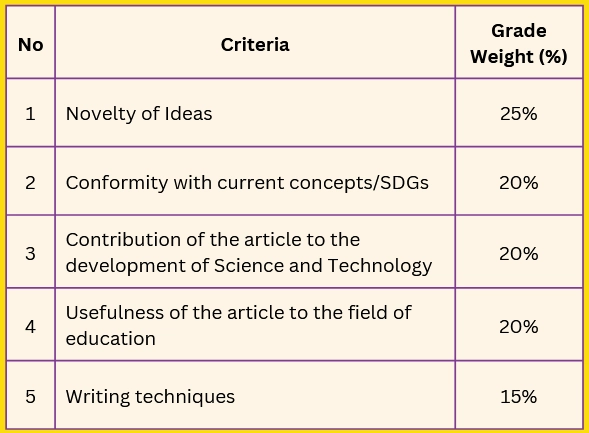
COMPETITION
16. SCIENTIFIC ARTICLE
Background
In the world of education, developing science and improving the quality of learning cannot be separated from scientific activities such as research and community service. One of the tangible forms of academic contribution is through the writing of scientific articles, which is an important medium for conveying ideas, ideas, and findings that can be used as scientific references and practices in the field.
Scientific articles are written works that are organized systematically, based on valid academic rules, and supported by empirical data or strong literature review. This article can be sourced from various academic activities such as Classroom Action Research (PTK), case studies, field practice, Real Work Lectures (KKN), or community service activities (PkM). In addition, article writing can also take the form of a literature study that examines and synthesizes the results of previous research to produce a new understanding of an educational issue or problem.
As a form of habituation to academic and scientific culture, students and educators need to be trained to be able to express their ideas in the form of articles that fulfill the structure of scientific writing, starting from the title, abstract, background, methodology, results and discussion, conclusions, to the bibliography. In addition, the aspect of originality and academic integrity is also an important part, so that the proposed article manuscript must consider aspects of similarity with the proposed article.
Theme
Teacher Digital Leadership & Professional Development
Type of Products
Paper
Sub Theme
-
Data-based Teacher Leadership Model
-
Digital Literacy
-
Literacy and Numeracy
-
Gamification and Innovation of Teacher Training
-
Technology-based learning strategies
-
Strengthening students character
-
Development of learning media
-
Evaluation of project-based learning
-
Vocational and Arts in Education
-
Learning Evaluation
-
Educational Management
-
Learning Injovation
-
Distance Learning
-
Educational Psychology
Objectives of The Competition
-
Encouraging a culture of scientific writing among students and educators as part of scientific development and professionalism in the field of education.
-
Fostering the ability to think critically, analytically, and systematically in studying educational issues through a scientific approach.
-
Facilitate the publication of scientific works on research results, case studies, or community service (PkM) that are relevant and applicable.
-
Improve academic skills in writing scientific articles that meet methodological rules and writing ethics, including originality with a similarity rate of ≤ 20%.
-
Provide a forum for appreciation and healthy competition for students and educators to contribute intellectually in solving educational problems
Special Conditions of Competition
-
Participants are students at the University proven by a Students Card.
-
The work is in accordance with the theme.
-
The content of the work must contain novelty.
-
The work has never been published.
-
Participants can consist of individuals or groups of a maximum of 2 people.
-
The number of words ranges from 4000-6000 words exluding the bibliography.
-
Writing refers to citations using APA 7th format reference.
-
Using Times New Roman, Font 12, line spacing 1.
-
Writing a statement authenticity of the work.
-
General scientific works consist of a title, abstract, introduction, methodology, discussion, conclusion and bibliography.
-
1 participant can submit a maximum of 2 papers.
-
All articles will be published in SINTA indexed journal.

Faculty Building 1, 3rd & 4th Floor
Pondok Cabe Raya Street, Pondok Cabe Udik, Pamulang District, South Tangerang City, Banten 15437, Indonesia
Copyright ©2025. LIP-KMN | FKIP Universitas Terbuka. All Rights Reserved.

